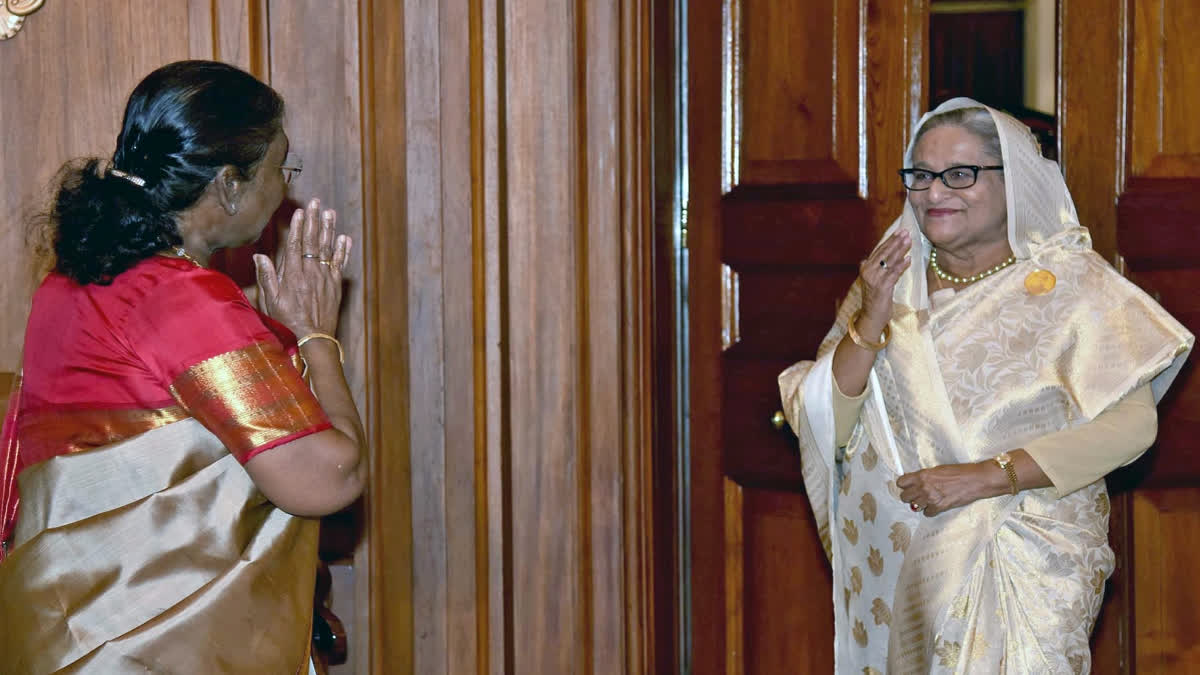New Delhi: With speculations rife about the future of India-Bangladesh relations after New Delhi gave refuge to ousted Bangladesh Prime Minister Sheikh Hasina, reconciliatory voices are emanating from Dhaka after a new interim government took charge with banker and Nobel laureate Muhammad Yunus as the Chief Advisor.
Following the first-ever diplomatic briefing after the less-than-a-week-old interim government took charge, newly appointed Foreign Affairs Advisor Md Touhid Hossain said on Monday that Hasina's stay in India will not affect ties between Dhaka and New Delhi.
"There will be no impact on the bilateral relationship between the two countries because of one individual's stay in a country," the Dhaka Tribune quoted Touhid, a former Foreign Secretary of Bangladesh, who had also served as that country's Deputy High Commissioner to India, as saying in response to a question after the diplomatic briefing. "Bilateral relations are very big thing and involve mutual interests. Both sides have their interests – India has its interests, and Bangladesh has its interests.”
After Hasina's election as Prime Minister for a fourth time in a row in January in parliamentary elections that the opposition parties boycotted, her popularity ratings had been falling because of what people saw as her autocratic style of functioning.
An anti-job quota movement started by students in Bangladesh in June this year blew up into a full-fledged revolution involving Islamist fundamental elements against Hasina’s Awami League government forcing her to flee to India on August 5. According to reports, Hasina and her sister Rehana have been given refuge in a safe-house in the Delhi NCR region.
Ahead of the parliamentary elections in Bangladesh held in January this year, she persistently refused to accept the opposition parties’ demand to install an interim government during the poll process. Though the US, EU and other Western powers persuaded her to accept the opposition's demand, she dismissed this as outside interference in an internal matter. India, all this while, maintained a neutral stance.
In the end, all the opposition parties, including the main opposition Bangladesh Nationalist Party (BNP), known for its anti-India policies in the past when it was in power, boycotted the elections that were eventually held. As a result, when Hasina's Awami League came back to power, she started running a virtually opposition-less government. For any democracy to function properly, a strong opposition is necessary.
This created rumblings within the system. As a result, what began as a students’ movement to protest against a job quota regime, eventually blew up into a full-fledged rebellion involving Islamist forces against Hasina's government leading to her ouster and the deaths of over 400 people.
Reacting to Foreign Affairs Advisor Hossain's remarks about India-Bangladesh ties, a former senior Indian diplomat with considerable experience serving in South Asia, told ETV Bharat that "it is very clear that they don’t want to create any irritation with India".
"If it becomes an issue, it will affect the bilateral agenda," the former diplomat said.
Hasina had developed a close personal relationship with the leadership of India over the last 15 years or so that she had been in power. She had also responded positively to India's concerns like ensuring that insurgents from the Northeast do not get shelter in her country. She is seen as secular and opposed to Islamist elements.
India was able to develop a deep relationship with Bangladesh under Hasina. It was a good cordial relationship and India was able to implement certain aspects of the Neighbourhood First Policy like building connectivity. Economic ties were on the upswing. The defence relationship became strong with India providing defence equipment and training to the Bangladesh armed forces.
It is because of all these that Hasina's ouster sparked speculations about the future of India-Bangladesh relations. Interestingly, Foreign Affairs Advisor Touhid's comments came soon after new Home Affairs Advisor Brig Gen (Retd) M Sakhawat Hossain said that Hasina should reorganise her Awami League party with fresh faces. He even invited her to return to Bangladesh.
"You have been mentioning that you plan to return to the country," Sakhawat was quoted as saying during a press conference at the Ministry of Home Affairs in Dhaka on Monday. "But why did you leave in the first place? You left voluntarily. This is your country; you are welcome to come back. However, please refrain from stirring up trouble. If you do, it will only agitate people further. We respect you."
Sakhawat went on to state that no political party would be banned as such actions tend to serve specific agendas, according to another Dhaka Tribune report. He said that a new political party act would be enacted so that no dictator can come to power and parties that are in power can be held accountable.
Asked about Sakhawat’s comments, the former Indian diplomat mentioned above said: "I think Sakhawat is making a suggestion. It is very uncertain. I don’t know what Hasina will do."
Meanwhile, Chief Advisor Yunus held a meeting with the main opposition party BNP on Monday afternoon during which the party’s secretary general Mirza Fakhrul Islam Alamgir said that the interim government would be given time to create a suitable environment for fresh national elections.
"At today’s meeting, we gave our opinions to the Chief Advisor on the necessary steps during the present situation of the country," the Daily Star quoted Fakhrul as saying after the meeting.
What happens in the political landscape of Bangladesh in the days, weeks and months to come can only be speculated upon as of now. Watch this space.




